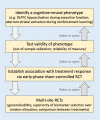Predicting Response to Brain Stimulation in Depression: a Roadmap for Biomarker Discovery
- PMID: 33708470
- PMCID: PMC7904553
- DOI: 10.1007/s40473-021-00226-9
Predicting Response to Brain Stimulation in Depression: a Roadmap for Biomarker Discovery
Abstract
Purpose of review: Clinical response to brain stimulation treatments for depression is highly variable. A major challenge for the field is predicting an individual patient's likelihood of response. This review synthesises recent developments in neural predictors of response to targeted brain stimulation in depression. It then proposes a framework to evaluate the clinical potential of putative 'biomarkers'.
Recent findings: Largely, developments in identifying putative predictors emerge from two approaches: data-driven, including machine learning algorithms applied to resting state or structural neuroimaging data, and theory-driven, including task-based neuroimaging. Theory-driven approaches can also yield mechanistic insight into the cognitive processes altered by the intervention.
Summary: A pragmatic framework for discovery and testing of biomarkers of brain stimulation response in depression is proposed, involving (1) identification of a cognitive-neural phenotype; (2) confirming its validity as putative biomarker, including out-of-sample replicability and within-subject reliability; (3) establishing the association between this phenotype and treatment response and/or its modifiability with particular brain stimulation interventions via an early-phase randomised controlled trial RCT; and (4) multi-site RCTs of one or more treatment types measuring the generalisability of the biomarker and confirming the superiority of biomarker-selected patients over randomly allocated groups.
Keywords: Biomarkers; Brain stimulation; Depression; Predicting response; TMS; tDCS.
© The Author(s) 2021.
Figures
Similar articles
-
Folic acid supplementation and malaria susceptibility and severity among people taking antifolate antimalarial drugs in endemic areas.Cochrane Database Syst Rev. 2022 Feb 1;2(2022):CD014217. doi: 10.1002/14651858.CD014217. Cochrane Database Syst Rev. 2022. PMID: 36321557 Free PMC article.
-
Identifying response and predictive biomarkers for Transcranial magnetic stimulation outcomes: protocol and rationale for a mechanistic study of functional neuroimaging and behavioral biomarkers in veterans with Pharmacoresistant depression.BMC Psychiatry. 2021 Jan 13;21(1):35. doi: 10.1186/s12888-020-03030-z. BMC Psychiatry. 2021. PMID: 33435926 Free PMC article.
-
Neural predictors of treatment response to brain stimulation and psychological therapy in depression: a double-blind randomized controlled trial.Neuropsychopharmacology. 2019 Aug;44(9):1613-1622. doi: 10.1038/s41386-019-0401-0. Epub 2019 Apr 30. Neuropsychopharmacology. 2019. PMID: 31039579 Free PMC article. Clinical Trial.
-
Transcranial Brain Stimulation Techniques For Major Depression: Should We Extend TMS Lessons to tDCS?Clin Pract Epidemiol Ment Health. 2014 Oct 3;10:92-3. doi: 10.2174/1745017901410010092. eCollection 2014. Clin Pract Epidemiol Ment Health. 2014. PMID: 25317200 Free PMC article.
-
Addressing heterogeneity (and homogeneity) in treatment mechanisms in depression and the potential to develop diagnostic and predictive biomarkers.Neuroimage Clin. 2019;24:101997. doi: 10.1016/j.nicl.2019.101997. Epub 2019 Aug 28. Neuroimage Clin. 2019. PMID: 31525565 Free PMC article. Review.
Cited by
-
The promise of machine learning in predicting treatment outcomes in psychiatry.World Psychiatry. 2021 Jun;20(2):154-170. doi: 10.1002/wps.20882. World Psychiatry. 2021. PMID: 34002503 Free PMC article.
-
Predicting the treatment outcomes of major depressive disorder interventions with baseline resting-state functional connectivity: a meta-analysis.BMC Psychiatry. 2025 Apr 7;25(1):340. doi: 10.1186/s12888-025-06728-0. BMC Psychiatry. 2025. PMID: 40197372 Free PMC article.
-
Biomarker development perspective: Exploring comorbid chronic pain in depression through deep transcranial magnetic stimulation.J Transl Int Med. 2024 May 21;12(2):123-128. doi: 10.2478/jtim-2023-0145. eCollection 2024 Apr. J Transl Int Med. 2024. PMID: 38779118 Free PMC article. No abstract available.
References
-
- •• Mutz J, Vipulananthan V, Carter B, Hurlemann R, Fu CH, Young AH. Comparative efficacy and acceptability of non-surgical brain stimulation for the acute treatment of major depressive episodes in adults: systematic review and network meta-analysis. bmj. 2019;364. Recent systematic review and meta-analysis comparing efficacy of different brain stimulation interventions for depression - PMC - PubMed
-
- Dandekar M, Fenoy A, Carvalho A, Soares J, Quevedo J. Deep brain stimulation for treatment-resistant depression: an integrative review of preclinical and clinical findings and translational implications. Mol Psychiatry. 2018;23(5):1094–1112. - PubMed
-
- Pascual-Leone A, Valls-Sole J, Wasserman E, Hallet M. Responses to rapid-rate transcranial magnetic stimulation of the human motor cortex. Brain. 1994;117(4):847–858. - PubMed
-
- Mayberg HS, Lozano AM, Voon V, McNeely HE, Seminowicz D, Hamani C, et al. Deep brain stimulation for treatment-resistant depression. Neuron. 2005;45(5):651–660. - PubMed
-
- Fregni F, Boggio PS, Nitsche MA, Marcolin MA, Rigonatti SP, Pascual-Leone A. Treatment of major depression with transcranial direct current stimulation. Bipolar Disord. 2006;8(2):203–204. - PubMed
Publication types
Grants and funding
LinkOut - more resources
Full Text Sources
Other Literature Sources
Research Materials

